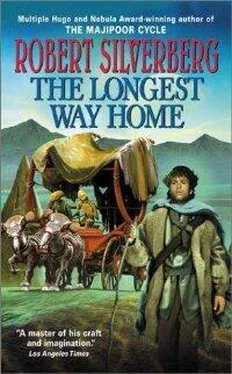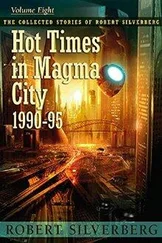The situation beyond the boundaries of the Ardardin’s village was continuing to worsen, apparently. Indigenes from other villages passed through here often, bringing reports on the troubles outside. Joseph never had the opportunity to speak with these visitors himself, but from the Ardardin he learned that all Manza had by now turned into a war zone: a great many Houses of the Masters throughout the northern continent had been destroyed, roads were closed, rebel troops were on the march everywhere. It appeared also that in certain parts of the continent the Masters were counterattacking, although that was still unclear. Joseph got the impression that fighting was going on between different groups of Folk, too, some loyal to the Masters, others sworn to uphold the rebellion. And bands of refugees were straggling south in an attempt to reach the Isthmus of Helikis and the safety that lay beyond. These must be surviving Masters, Joseph thought. But the Ardardin could not say. It had not seen a need to go into such a degree of detail with its informants.
None of this chaos seemed to cause much of a problem for the Indigenes themselves. By now Joseph had come to see how completely their lives were bound up in their villages, and in the tenuous ties that linked one village to the next. So long as nobody’s troops came swarming across their fields and their harvests went well, the struggles of Masters and Folk were matters of little import to them. His discussions with the Ardardin had made it clear to him why they had that attitude.
Commerce between the Indigene villages, therefore, still was proceeding as though nothing unusual were going on. The Ardardin proposed to turn that fact to Joseph’s benefit. Other villages down the line would surely have need of Joseph’s services as a healer. Now that he was capable of traveling, they would convey him to one of the nearby villages, where he could take care of whatever medical problems might need his attention there, and then those villagers would take him on to the next village, and so on and so on until he had reached a point from which he could cross over into the safety of Helikis.
Joseph, remembering his fears that the Ardardin’s people might not allow him to leave at all, felt a burst of chagrin, and gratitude also for the Ardardin’s kind willingness to help him along his way like this.
But it occurred to him that it might be just as wrong to imagine kindness here as it had been to fear enslavement earlier. It was a mistake, he realized, to ascribe conventional human feelings—altruism, selfishness, whatever—to Indigenes, indeed to interpret their motivations in any way analogous to human thinking. He had been guilty of that again and again in his dealings with the Ardardin and the villagers, but he knew by this time that it was something to avoid. They were alien beings. They had followed a wholly different evolutionary path for millions of years. They walk on their hind legs like us, he thought, and they have a language with nouns and verbs in it, and they know how to plant and harvest crops and fashion pottery, but that did not make them human in any essential way, and one had best take them on their own terms or else not try to take them at all.
He had another taste of that when it was time for him to go. He had imagined that there might be a fairly emotional farewell, but the silliness of that bit of self-deception quickly became evident. The Ardardin expressed no regret whatever at Joseph’s departure and no hint that any sort of friendship had sprung up between the two of them: not a syllable of thanks for his work in the infirmary, none for their afternoon conversations. It simply stood looking on in silence while Joseph climbed into the wagon that would take him once again toward the south, and when the wagon pulled out of the village compound the Ardardin turned and went inside, and that was as much of a farewell as Joseph had.
They are not like us, Joseph thought. To them we are mere transient phenomena.
Once more he rode in a wagon drawn by a team of dull-eyed yaramirs, and once more Ulvas traveled with him, along with two other Indigenes whose names were Casqui and Paca. Joseph had no idea of the route he would be traveling now. There did not seem to be any word in Indigene for “map,” and the Ardardin had not offered him much verbal information about the location of the next Indigene village.
The first part of the journey took him along the same slow, winding road, cobblestoned and narrow, that they had used in the trip to Ludbrek House. An old Indigene road, no doubt. Very old. Five thousand years? Ten thousand, even? It was suitable only for clumsy creaking wagons like this. In all the centuries and tens of centuries since this road had been built, probably nothing in it had been changed but for the replacement of a loose cobble every once in a while. It was just a quiet country road; the Indigenes had never seen any reason to transform it into a major highway.
It occurred to him that for the Indigenes time must seem to stand virtually still. They looked at everything under the auspices of eternity, the invisible sky, the hidden gods. Their gods were not much interested in change, and therefore neither were they. They made even a sleepy people like the Folk seem ferociously energetic. And the Folk themselves, he thought grimly, were not behaving all that sleepily these days.
As on his previous journey, a cool southern wind was blowing, stronger than it had been before and moist now, an unmistakable token of the coming rainy season that was still somewhere to the south of them but already sending its harbingers north. It never seemed to let up. Joseph turned sideways in the wagon to avoid its unending direct thrust.
The second day of plodding travel found them still moving along the road that led toward Ludbrek House. Joseph hoped they were not going to take him back there. He had no desire to see that sad ravaged place again. But that afternoon a second road appeared to their left, a road just as humble as the one they had been on, and the wagondriver Casqui swung the vehicle onto it with a couple of sharp syllables to the yaramirs.
Though their direction was easterly now rather than southerly, the countryside had not changed much. It was the same flat farmland as before, broken only by gently rolling meadows and, farther away, the purple humps of modest hills.
In late afternoon a big modern highway came into sight in the distance. It ran from north to south and thus lay squarely athwart their route. “Get under the furs,” Ulvas told him. “Sometimes now they check the wagons that go by.”
“Who does?” Joseph asked. “Masters, or Folk?”
Ulvas made the crossed-arms gesture, the Indigene shrug. “Whoever might be checking things that day. It does not matter, does it?”
The Indigene road, Joseph saw, ran right up to the great highway that the Masters had designed and the Folk had constructed. It halted at the edge of the highway and, he assumed, resumed on the other side. The broad smooth road was like a wall cutting across the land, marking a place where the native culture of this world and the culture of the Masters met. What had the Indigenes thought when these highways began sprouting on their land? Nothing at all, replied Joseph to his own question. Nothing at all. The highways meant nothing to them; the Masters meant nothing to them; this world itself meant nothing to them. This world was only a film lying over the invisible world that was true reality.
Trucks, big trucks newly repainted in drab military-looking colors, were moving at a brisk pace in both directions on the highway. Rebel trucks, most likely. There were not enough Masters in this whole continent to staff a real army. The much more numerous Folk seemed to have conjured one up and equipped it with all the industrial and commercial vehicles in Manza, though. Just as he had on his first day in the Getfen forest, Joseph trembled at the thought that the rebels—the Folk, the supposedly obtuse and doltish Folk—had been able very quietly to plan this formidable insurrection and put it into operation while the vastly superior intellects of the dominant Masters had somehow failed to detect that anything unusual was going on. And he wondered for what grim purpose it was that this roaring convoy of trucks was heading across the land.
Читать дальше












